Syllabus - College of Nursing
advertisement
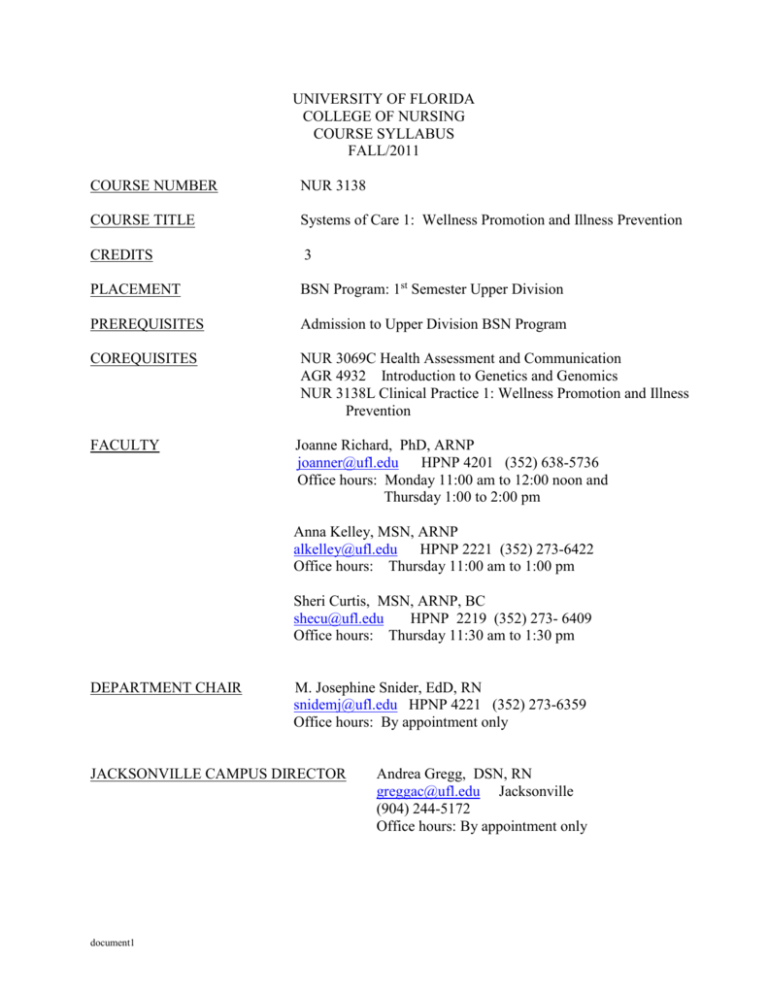
UNIVERSITY OF FLORIDA COLLEGE OF NURSING COURSE SYLLABUS FALL/2011 COURSE NUMBER NUR 3138 COURSE TITLE Systems of Care 1: Wellness Promotion and Illness Prevention CREDITS 3 PLACEMENT BSN Program: 1st Semester Upper Division PREREQUISITES Admission to Upper Division BSN Program COREQUISITES NUR 3069C Health Assessment and Communication AGR 4932 Introduction to Genetics and Genomics NUR 3138L Clinical Practice 1: Wellness Promotion and Illness Prevention FACULTY Joanne Richard, PhD, ARNP joanner@ufl.edu HPNP 4201 (352) 638-5736 Office hours: Monday 11:00 am to 12:00 noon and Thursday 1:00 to 2:00 pm Anna Kelley, MSN, ARNP alkelley@ufl.edu HPNP 2221 (352) 273-6422 Office hours: Thursday 11:00 am to 1:00 pm Sheri Curtis, MSN, ARNP, BC shecu@ufl.edu HPNP 2219 (352) 273- 6409 Office hours: Thursday 11:30 am to 1:30 pm DEPARTMENT CHAIR M. Josephine Snider, EdD, RN snidemj@ufl.edu HPNP 4221 (352) 273-6359 Office hours: By appointment only JACKSONVILLE CAMPUS DIRECTOR document1 Andrea Gregg, DSN, RN greggac@ufl.edu Jacksonville (904) 244-5172 Office hours: By appointment only COURSE DESCRIPTION The purpose of this course is to examine models of health in wellness promotion and illness prevention across the lifespan. Emphasis is on the individual in the context of family and environment. Focus is on evidence-based risk appraisal and reduction. COURSE OBJECTIVES Upon completion of this course, the student will be able to: 1. Integrate beginning concepts of wellness promotion and disease, injury, and disability prevention with individuals across the lifespan in a variety of settings. 2. Describe primary, secondary, and tertiary prevention strategies used in a variety of healthcare settings. 3. Identify environmental factors that influence the healthcare needs and preferences of individuals as members of families. 4. Compare and contrast methodologies used in health teaching and health counseling. 5. Discuss from a nursing perspective contributions to the work of interprofessional healthcare teams in facilitation of positive healthcare outcomes for clients. COURSE SCHEDULE Section 2217 Day Thursday Time 1:55 to 4:55pm Room HPNP 1404 E-Learning (Sakai) is the course management system that you will use for this course. E-Learning is accessed by using your Gatorlink account name and password at http://lss.at.ufl.edu. There are several tutorials and student help links on the E-Learning login site. If you have technical questions call the UF Computer Help Desk at 352-392-HELP or send email to helpdesk@ufl.edu. It is important that you regularly check your Gatorlink account email for College and University wide information and the course E-Learning site for announcements and notifications. Course websites are generally made available on the Friday before the first day of classes. ATTENDANCE Students are expected to be present for all scheduled classes, other learning experiences, and examinations. Students who have extraordinary circumstances preventing attendance should explain these circumstances to the course instructor prior to the scheduled class or as soon as possible thereafter. Instructors will then make an effort to accommodate reasonable requests. A grade penalty may be assigned for late assignments, including tests. There will be no make-ups for missed quizzes or minute papers. Make-up exams for the Midterm and Final Exams will be given only under extenuating circumstances that could not have been predicted ahead of time and the format will be essay questions.. document1 ACCOMMODATIONS DUE TO DISABILITY Each semester, students are responsible for requesting a memorandum from the Disability Resource Center to notify faculty of their requested individual accommodations. This should be done at the start of the semester. STUDENT HANDBOOK Students are to refer to the College of Nursing Student Handbook for information about College of Nursing policies, honor code, and professional behavior. TOPICAL OUTLINE 1. 2. 3. 4. 5. 6. 7. 8. Concepts of wellness promotion and illness prevention across the lifespan and settings a. Healthy People initiatives b. Models of health c. Incidence and prevalence d. Primary, secondary, and tertiary prevention e. US Preventive Task Force recommendations Effective health education strategies in a variety of practice settings a. Individual safety b. Occupational/environmental safety c. Wellness education d. Health literacy, technology, and information management Principles related to a. Infection control b. Hygiene c. Hydration d. Mobility e. Elimination Individual and family wellness promotion and illness prevention a. Normal pregnancy and fetal care b. Postpartum care c. Newborn care and feeding d. Childhood (e.g. prevention of accidents, immunizations, obesity) e. Adulthood (e. g. menopause, monitoring, lifestyle modification) f. Older adult care Risk appraisal, risk reduction and vulnerability Environmental assessment Nursing and interprofessional interventions for individuals in the context of family Evaluation of interventions TEACHING METHODS Lecture, discussion, quizzes, tests, in class activities LEARNING ACTIVITIES Class participation, written assignments, quizzes, tests, reading assignments document1 EVALUATION METHODS/COURSE GRADE CALCULATION Minute Papers 12% (random dates—best 4 of 5 count--no make-up allowed) Quizzes 15% (random dates—best 5 of 6 count--no make-up allowed) Test 1 19% (9/29/11) Test 2 19% (11/3/11) Final Exam 35% (12/12/11) 100% Feedback on all graded assignments routinely is given within five [5] working days of the due date. GRADING SCALE/QUALITY POINTS A AB+ B BC+ 95-100 (4.0) C 74-79* (2.0) 93-94 (3.67) C72-73 (1.67) 91- 92 (3.33) D+ 70-71 (1.33) 84-90 (3.0) D 64-69 (1.0) 82-83 (2.67) D62-63 (0.67) 80-81 (2.33) E 61 or below (0.0) * 74 is the minimal passing grade REQUIRED TEXTS Berman, A. & Snyder, S. (2012). Kozier & Erb’s Fundamentals of Nursing: Concepts, process, and practice (9th ed.). Boston: Pearson. Perry, S.E., Hockenberry, M.J., Lowdermilk, D.L., & Wilson, D. (2010). Maternal child nursing care (4th ed.). Maryland heights, MO: Mosby Elsevier document1 WEEKLY CLASS SCHEDULE WEEK DATE 1 8/25 2 9/1 3 9/8 4 9/15 5 9/22 6 9/29 7 10/6 8 10/13 9 10/20 10 10/27 11 11/3 12 11/10 13 11/17 14 11/24 15 12/1 12/12 Approved: document1 TOPIC READING—Do before class Introduction and Overview of Course Levels of Prevention Infection control Note: class time is 6:00 to 8:30 pm Hygiene Elimination Hydration Mobility Healthy People Initiatives, models of health, Incidence and prevalence US Preventive Task Force recommendations Test 1 Syllabus & Sakai site pgs. 28, 99-104, 106-109, 275-294 pgs. 670 -677, 685-711 Risk appraisal, risk reduction, Vulnerability Environmental assessment Individual safety Occupational/environmental safety Wellness education Health literacy, technology and information management Normal pregnancy and fetal care Postpartum care (Professor Kelley) Test 2 Pgs. 353-360, 439-441, 1187-1190, 1253-1257 Newborn care and feeding (Professor Kelley) Childhood (accident prevention, immunizations, obesity) (Professor Curtis) Adulthood (menopause, monitoring, lifestyle modification) Older adult care Holiday Perry et al text: pgs 643-705 Berman & Snyder text: pgs 372-397, 678-679, 1129-1134, 1257-1259 Interventions in the context of family Evaluation of interventions Final Exam 12:30 to 3:00 pm Pgs. 239-245, 434-443 Academic Affairs Committee: General Faculty: UF Curriculum Committee: 09/09 09/09 10/09 pgs. 749-802, 919-954 pgs. 1307-1337, 1347-1366 pgs. 1129-1176 pgs. 1450-1457, 1459-1467 Pgs. 285, 298-312 www.HealthyPeople.gov www.ahrq.gov Pgs. 455-458, 710-711, 716-737 pgs. 144-145, 148-154, 492-514 www.nih.gov Perry et al text: pgs 229-294, 533575 pgs. 400-408, 412-429, 1099-1115, 1187, 1260-1261 HSC 2-200 (MSB Auditorium)



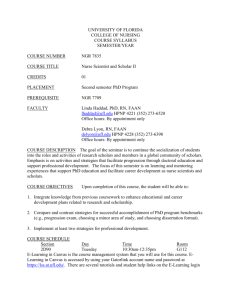
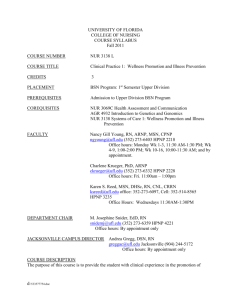
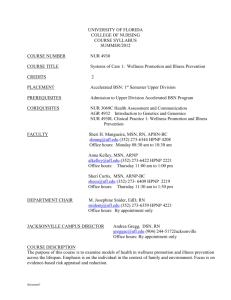
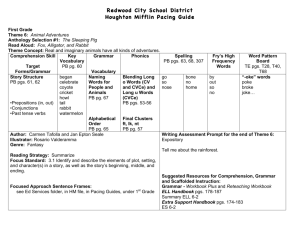
![Introduction [max 1 pg]](http://s3.studylib.net/store/data/007168054_1-d63441680c3a2b0b41ae7f89ed2aefb8-300x300.png)